Last week in Xiangtang Village, a suburb of Beijing, hundreds of men dressed in black arrived, accompanied by a fleet of excavators. They handed residents notices, informing them the government concluded that their properties were illegally built, and that they had seven days to pack their belongings and move out as their homes would be demolished.
Eyewitnesses said many tried to protest but were subdued by the guards. Yang Yusheng, a law professor at China University of Political Science and a resident at the village, started a hunger strike and wrote online about his anger and frustration with the government’s decision. Soon, his electricity and water were cut off, apparently in retaliation, as temperatures outside dipped below freezing.
The episode marked the latest faceoff between China’s central government authorities and an informal housing financing system called the Small Property Rights Housing (SPRH).
Small Property Rights Housing
The Small Property Rights Housing system has been an important, but informal, part of China’s growth for years.
“There are a lot of SPRH in China for the last 30 years because development took place at such a rapid rate that the law and approval of the land couldn’t keep pace with development,” said Lynette Ong, an associate professor of political science at the University of Toronto. “So SPRH is a way to bypass that bottleneck.”
As commercial properties developed on rural land owned by collectives, owners were able to bypass the legally required state approval process by allowing local governments to sell small property rights directly to buyers at a discounted rate.
The system has proven successful in the past, but it carries risks for buyers.
“Those people who bought SPRH should know that the property rights are not totally secure,” Ong told VOA.
Although officially deemed illegal by the government, SPRH has been widely popular in China’s big cities where formal housing prices are constantly rising and increasingly unaffordable.
For the past two decades, when turbocharging China’s economy was a top government priority, many of these construction projects were blessed by local governments. Now, as Chinese President Xi Jinping stresses the importance of green space and environment, that policy has ended and demolitions are on the rise.
New victims: The middle class
While past demolitions often targeted low-income residents, the latest campaign has hit the comparatively well-to-do: people able to afford single-family homes in the bucolic countryside outside Beijing’s congested urban area.
Xiangtang Village is a perfect example. According to its official website, the bucolic sceneries attracted “famous figures from news media, entertainment industry and art industry” to reside in Xiangtang. The village was named one of “the most beautiful villages in Beijing” in 2007. In 2008, it was named one of “the best Olympic Tourism Villages” in the city.
Now, more than 500 out of roughly 3,800 homes there are designated as illegal construction projects and will be demolished before the Chinese Lunar New Year.
VOA reached out to the village committee on Monday and was told that they could not answer any questions regarding the demolition notices.
Professor Yang Yusheng told VOA that the government’s action is not in line with its own interest to maintain social stability.
“There’s also no legal channel to appeal or present your case. People are angry,” he said, adding these forced evictions and demolitions usually come with no compensation to the owners.
Hong Sheng, an economist who has done extensive studies on small property rights housing in China, told VOA that these forced evictions violate the people’s right of residence. He added that despite its ambiguous legal status, the existence of SPRH supplements the short supply of affordable housing provided by local governments.
“It takes decades to build a community, but it only takes a second to demolish it,” he said.
Professor Ong argued that the move was to generate fiscal revenue for the local government and cautioned that such blunt government actions would lead to sowing resentment and distrust of the Chinese Communist Party’s rule.
“These people have quite a bit of wealth; they would not keep quiet and let the government do the job,” she said.




